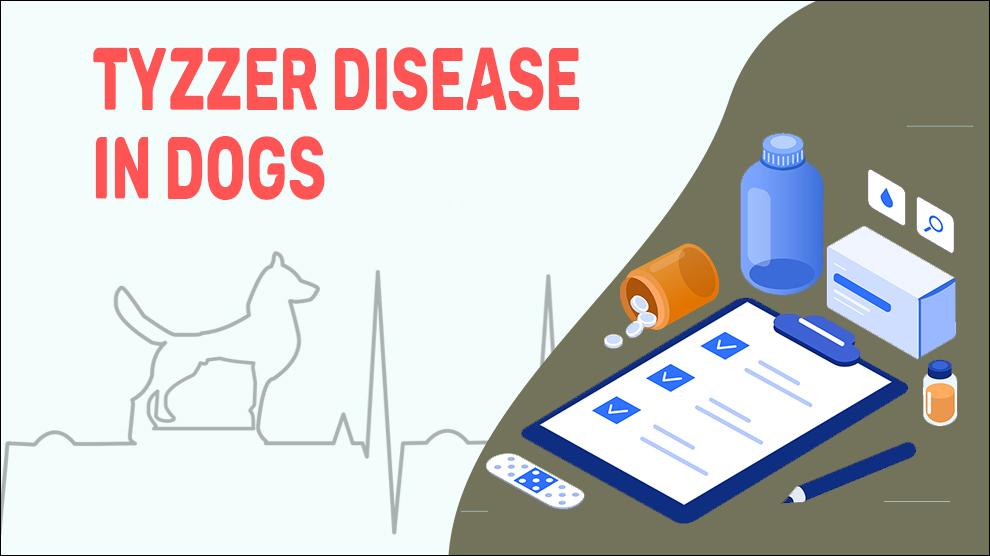What Is Tyzzer Disease In Dogs?
Tyzzer's disease is an epizootic bacterial disease caused by a spore-forming, motile, gram-variable, intracytoplasmic, obligate bacterium called Clostridium Piliforme previously known as Bacillus Piliformis) causing acute hepatic necrosis and acute hepatic failure. Simply, Tyzzer's disease is a common term for bacterial enteritis caused by C. Piliforme.
Ernest Edward Tyzzer, a professor at Harvard Medical School discovered the microbe in 1917. He extracted the C. Piliforme from Japanese waltzing or dancing mice. The host range of this microbe is broad and in dogs, the pathogen is involved frequently in young puppies, immunosuppressed dogs, and old dogs.
The target organs in dogs are the intestine (proximal colon, distal ileum, cecum, etc), the liver, and, rarely, the heart. Enteric lesions may be fatal, often with a demonstration of bacilli in smooth muscle cells of the tunica muscularis interna/externa, muscular mucosa, and epithelial cells. Focal hepatic necrosis is the most often encountered lesion in all species of affected animals.
There has been only a single case report documenting a C. Piliforme infection of a human being since the first account of Tyzzer's disease in 1917. As portrayed in the canine case reports, that person was severely immunosuppressed because of a recurrent viral infection; but the human infection manifested as skin lesions and not as internal lesions.
Symptoms Of Tyzzer Disease In Dogs
- Abdominal pain or swelling
- Jaundice
- Rapid/ shallow or Labored breathing
- Weakness
- Convulsions
- Ruffled or coarse fur
- Exercise intolerance
- Excessive urination or thirst
Treatment Options For Tyzzer Disease In Dogs
There is no proper treatment protocol available for Tyzzer disease
Antibiotics: Amoxicillin/Clavulanate (Clavamox), Azithromycin, Chloramphenicol, Clindamycin, Doxycycline, Tetracycline, etc
Anti-inflammatory and Immunosuppressive Therapy:
Cyclosporine, prednisolone or prednisone, Budesonide, Sulfasalazine, or Chlorambucil
When your dog has frequent bouts of diarrhea in a short time period, Metronidazole(Flagyl, Protostat, Metizol, Metrogel) is used for the diarrhea
Dietary management:
- Swap over to a diet that leads to antigenic modification (eg, novel protein source, protein hydrolysate)
- Exclusion diet: Taking away ingredients that are suspected to cause allergies encountered
- A home-made balanced diet is always better than commercial diets
Home Remedies For Tyzzer Disease In Dogs
- Home remedies such as medications, exercise options, and diet will be based on your dog’s age and severity of the disease.
- Work with your vet to find the optimal dietary plan for your dog.
How To Prevent Tyzzer Disease In Dogs?
- Outdoor dogs living in endemic regions are at higher risk.
- Hound breeds, hunting and herding dogs living in close proximity to water sources wooded areas overturned soil (i.e., farms, agricultural sites), or water bodies seem to be predisposed to this infection.
- Direct transmission between dogs and humans does not occur. In the last 100 years, only 1 human infection has happened.
- Sanitize the water sources. Keep your lawn or garden clean. Maintain it neat and free of fleas to evade unwanted complications.
Affected Dog Breeds Of Tyzzer Disease
- There is no breed disposition
- Puppies/Immunocompromised dogs/ older dogs
Causes And Types For Tyzzer Disease In Dogs
1. Cause:
- Puppies (<six months) in unsanitary conditions or congested housing
- Immunocompromised dogs/older dogs
2. Types:
Acute Tyzzer disease: Sudden onset and most destructive.
Chronic or Tyzzer disease: This lasts for several weeks or even longer.
3. Diagnosis:
- A complete blood count (CBC), chemistry profile
- Abdominal ultrasound
- X-ray
- ECG (electrocardiograph) / echocardiogram
- Viral infection tests to rule out viral infections
- Fecal smears/cultures / PCR testing
4. Prognosis:
The scale of the infection depends on the age, any coexisting infections, and the immune response of the host. The prognosis for Tyzzer disease is generally guarded. Most dogs undergoing contracting the infection will die within 48 hours. If left untreated, severe cases of Tyzzer can be deadly for older dogs/puppies, so head to your vet immediately.
When To See A Vet For Tyzzer Disease In Dogs?
Contact your vet right away, if you notice:
- Abdominal pain or swelling
- Jaundice
- Rapid/ shallow or Labored breathing
- Weakness
Food Suggestions For Tyzzer Disease In Dogs
- Fresh vegetables/fruit (green beans, carrots, banana, apple, orange)/ Cooked spinach and potatoes
- Lean, home-cooked meats (chicken, turkey, beef, fish)
- Beef, fish like tuna, and dairy products - milk and cheeses
- Low-sodium cheese (Look for the Heart Healthy labeling)
- Plant-based protein sources – Lentils, Chickpeas, potatoes, other Nuts, and Seeds
- Raw meaty bones, raw lamb flaps, or chicken wings
Conclusion
While C. Piliforme is not considered to be a zoonotic bacteria and it cannot be passed between humans and animals, it is always good to practice good self-hygiene.
The prognosis for Tyzzer disease varies correspondingly with delay in detection, severity, and evidence of the failure of vital organs.

















